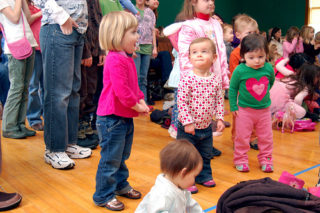
What is ThriversEd? It’s a new way to play. Toddlers who master it will play better at everything – for life.Photo by: yorkd
So: What is ThriversEd?
It’s a way of playing with Toddlers that might look an awful lot like a talk show to an afternoon TV watcher: Lots of music and dancing, recurring structured activities (including Stone Soup), regular audience interaction.
At its most basic, ThriversEd is an activities program for a playground or day-care center: Busking with busy-ness. Picture a doofus who looks a lot like me with an acoustic guitar and a quick wit. Rock ’n’ Roll to induce dancing to a temporary torpor, Stone Soup, The Marshmallow Challenge or some other game, chat, rinse and repeat.
That is the indispensable essence of ThriversEd, beyond which everything else is a frill: A cyclic structured EduPlay by way of BuskerTainment. As a curriculum, it is actively and overtly didactic, but it is ecumenical except for the explicit doctrinal strategy: Cultivating Ds/Sd habits of mind in Toddlers, all as the means of teaching them to thrive by habituated thriving. And every bit of this will look like very fun play to kids.
Accordingly, ThriversEd is broadly horizontal: Appropriate authority is earned and fungible (as with The Dutch Uncle Game), and evaluations can move in all directions, regardless of age or status. Meanwhile, the content is understood to be emergent, organic and crowd-sourced: Except for the guitar and the quick wit, most of the fun will be created by the kids themselves, in the moment. That is: Not a top-down, artist/teacher-aims-at-audience structure, but rather a wide-open volleyball-without-a-net experience, where many people contribute to make a satisfying whole.
Note that I consistently refer to Toddlers as people. That matters a lot, and it’s a way of understanding why this structure must be hugely horizontal – Barely Jesuit, one might say. Another way of saying the same thing: The play-space is a Dutch Uncle Game and I control the token.
Just that much is actual Dutch Uncle-ing scaled and made self-motivating and self-sustaining. Most children sunder eventually because they are flowerboxed from Day One, but they are flowerboxed because they are underfatherted. The corollary proposition is that the kids most likely to have bright prospects in life are the ones who are most thoroughly fathered – Testudo fathered.
No one can give kids better dads except their own dads, but anyone can step up to try to fill the gap – including kids themselves. The kind of skatepark ethos undergirding ThriversEd induces Toddlers to father themselves – to learn how to manage their passions and impulses to maximize fun and minimize conflict. (This is the “why” of the skatepark ethos in the first place: Underfathered boys building a culture of honor from scratch.)
I like the leadership role – the guitar and the quick wit – to be male and elderly, grandfatherly and irrepressibly dutch-avuncular, but I’m picturing me in the first place. The kids are going to have to raise themselves, alas, but the lead goose is there to provide a role model in lieu of that absent or checked-out father: A proudly masculine frame in everything, with bright-line moral standards and a heart of melted butterscotch.
That ain’t fatherhood for anyone. At best it’s 5% of what’s missing. And 5% for twenty kids doesn’t equal a committed dad for anyone, either. But anything is better than nothing, and what I am dishing up is both the food of Splendor and the seedstock for cultivating infinitely more, forever.
That very basic thing – ThriversEd as a style of structured playground or day-care BuskerTainingEduPlay – is Dutch Uncle-ing scaled, since the limited benefit of a Dutch Uncle can be shared without much dilution among fifteen or more Toddlers (given sufficient numbers of grown-up kitten-herders). And that basic idea scales again in really interesting ways.
So in very short order ThriversEd could be streaming live daily. Not fifteen kids but 1,500, maybe more, every day for three hours a day. And that video accumulates at a pace of fifteen new hours a week, thus to be revisited by anyone, anywhere, anywhen. I like the idea of ThriversEd being on day-care-center TV sets and kiddie-tablet computers all the time.
Everything I’ve talked about so far implies a very robust online social-networking community. Thrivers and their parents have much to share with each other – funny how that works, huh? – and the games I’ve talked about both profit from and reward sociability.
The games themselves benefit from robust database implementations. PEAK in any form can be thought of as a sort of FitBit for teleology, and The Dutch Uncle game is inherently MLM-able: A social network that rewards you for growing your personal social network. Gamification emerges organically from games, obviously, but PEAK serves over time to align choices with the optimal strategy for achieving Splendor – and all of your results can be tracked and tweaked over time. Everything I want is devised to be inherently self-coaching, but software can make that process a lot easier.
There’s more – including monetization ideas and a second activities-curriculum, called StriversEd, for older children – but I don’t want to muddy the waters. In due course I’ll flesh out the games, but they’re all hugely simple – leveraging the PEAK idea with lots and lots of practice.
So: Again: What is ThriversEd?
It’s a new way to play. Toddlers who master it will play better at everything – for life.















